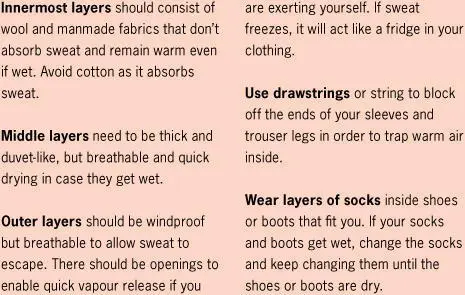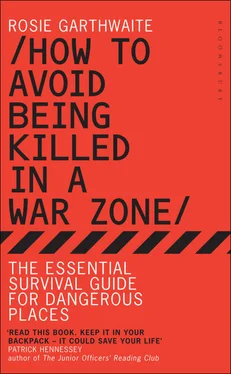There are a few tricks I have learnt along the way about coping with cold, and I’ve discovered many more in writing this book. The first one is to eat – a lot – something that Dr Carl Hallam agrees with:
‘I was in north Norway for three months every winter as a British Royal Marine, learning how to cope with cold weather from the bossy staff sergeants, who had a saying – “Any idiot can be cold”. You will cool down just like any other object in the environment unless you are prepared for it. We would eat around 5000 calories a day: one big meal in the morning and one in the evening, with a rest after both of them because the blood goes to the stomach after eating. You have to give it time to get back to the limbs.’
CLOTHING TO KEEP OUT THE COLD

There are some other survival basics to remember, and Kamal Hyder has them all down to a T:
‘One thing you should never take for granted is the weather. If you are going to the desert, it’s going to be hot in the day, but freezing at night. Be ready for both extremes. Carry extra jackets if necessary. The weather is very unforgiving in Afghanistan and Pakistan. The one big thing is to have protection from rain, water or snow. If you are wet, you can’t do very much.
‘We were doing a trip up in the tribal territories as part of a peace caravan that was travelling from Pakistan into Afghanistan. It was so cold that I lost 7 kilos in 10 days. If it wasn’t for my Gore-Tex jacket, I would have died on the trip.
‘We took a four-wheel drive along with us, filled purely with wood, causing giggles amongst our fellow hardy trekkers. Whenever we had a chance, we would get together and have a big bonfire. The same people who had been laughing at us were all there enjoying its warmth. It is so important to bring basic things that keep you warm and dry.’
There are more hi-tech ways of keeping warm if you are staying for a long period. Shelley Thakral has some useful advice:
‘We were revisiting the site of the 2005 Kashmir–Pakistan earthquake as the snows were coming in. People were still living in tents. We were there with the British Army, who had brought fantastic kit – tankers with ski-grips on them and things like that. But I’d never been so cold in my life. I was going to bed wearing every bit of clothing I possessed. But we had to go on. You have to use your frozen fingers and thumbs to work the computers.
‘There are always going to be times when you are cold. Be prepared to be unprepared. There are tricks you can learn from the experts about kit – the right shoes, the best socks… Consider taking a small generator so you have heating and light at some point in the day. And most of all, if you can, always try to stay with the UN. Their camps are more long-term, and aimed at comfort-loving civilians.’
Finally, always assume that you might be forced to spend the night in the cold and go prepared. Leith Mushtaq says: ‘I was born in a furnace – I am Iraqi. In Afghanistan it was minus 20. I always travel with a sleeping bag.’
You are a small, warm thing competing with the huge, cold outdoors. You will be cooling by degrees all the time unless you take preventive measures.
Preventing hypothermia
• Keep clothing dry by wearing the appropriate protective layer – a wind-cheater, something waterproof but breathable.
• Wear a hat at all times.
• If you do have to go into water, take off as many clothes as possible and hold them above your head or wrap them in something waterproof while you make the crossing.
• If someone has an injury that means they cannot move, try to find a way of keeping them moving at least one limb or another with response games – like trying to slap a hand before it moves away.
• Watch for signs of hypothermia in yourself and your team (see below).
Signs of hypothermia
• Slowed responses and unnatural bursts and hollows of energy.
• Uncontrollable shivering and impaired eyesight.
• The sufferer will be making mistakes all the time.
• Dexterity will be low and the person will be stumbling while walking.
• Headaches and stomach-aches will develop before complete collapse and unconsciousness.
• The pulse will slow and eventually stop if not treated.
Treatment of hypothermia
• Protect the casualty from the elements, out of the wind and rain.
• Replace any wet clothes with dry ones.
• If the person is awake, feed them sugary foods and water. Hot tea, coffee or soup are ideal. Do not give alcohol – it will cool them down in the long run.
• Start to warm the person up. Separate them from the cold ground with clothing or a mat. Add your body warmth to theirs. Get inside a sleeping bag with them. Put heat sources, such as warm rocks or hot-water bottles, on any parts of the body where the blood is close to the skin – think pressure points (see Pressure points to control bleeding). If they are severely cold, their body might take hours to re-warm – it has lost the ability to do so itself. It must carry your warmth via their blood to their core.
Warning:Do not apply anything very hot to the body: it might cause burns that go unnoticed because the body is not able to react to protect itself as it normally would. Also, if you try to heat the body up too quickly, the cold blood will head into the core as a form of protection, making the problem worse.
In extremely cold conditions a major concern is frostbite, which is when the skin actually freezes. The water in your cells expands, bursting the cell walls and ruining the affected area. The further a body part is away from the heart, the bigger the risk of it getting frostbitten. Nose, ears, feet and hands are all particularly vulnerable.
There is a hotel in Nepal called the Yak & Yeti. It’s popular with climbers returning from ascents of Everest. One morning I went down to the hotel restaurant for breakfast after working through the night on a last-minute edit. I was starving. A group of Japanese climbers joined the queue behind me for a fry-up. I turned and looked at them, put down my still-empty plate and returned to my room. Their faces were black with frostbite. They reminded me of a Peruvian mummified woman I’d seen in the Andes. One of climbers had lost his nose, and two had bandages around the stump they had left for one arm; their other hand, bandaged too, was clearly missing fingers.
I am not going to provide gruesome drawings of frostbite. I hope you have all seen it before on television or in a textbook somewhere. Please read the description carefully to work out the level of seriousness.
Preventing frostbite
• Keep making regular checks of the vulnerable body parts. As the area numbs, it will be harder to feel what is happening.
• Keep the problematic areas moving. Wiggle your fingers, wiggle your toes, massage your face or pull faces.
• If someone is injured and can’t move around much, massage their feet, hands and face. Keep all the mobile limbs moving.
Signs of frostbite
• Numbness or a prickly sensation in the skin.
• The affected part will go white, then harden.
• The part will swell with the frost, then break into blisters before turning black and dropping off.
Treatment for frostbite
The good news is that if you catch it early enough, frostbite is totally reversible.
The bad news is that the cure – thawing out – is very, very painful. Give the casualty painkillers to help take the edge off.
Читать дальше





![Джонатан Димблби - Barbarossa - How Hitler Lost the War [calibre]](/books/385421/dzhonatan-dimblbi-barbarossa-how-hitler-lost-the-w-thumb.webp)







